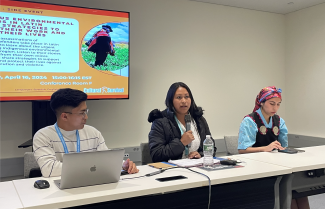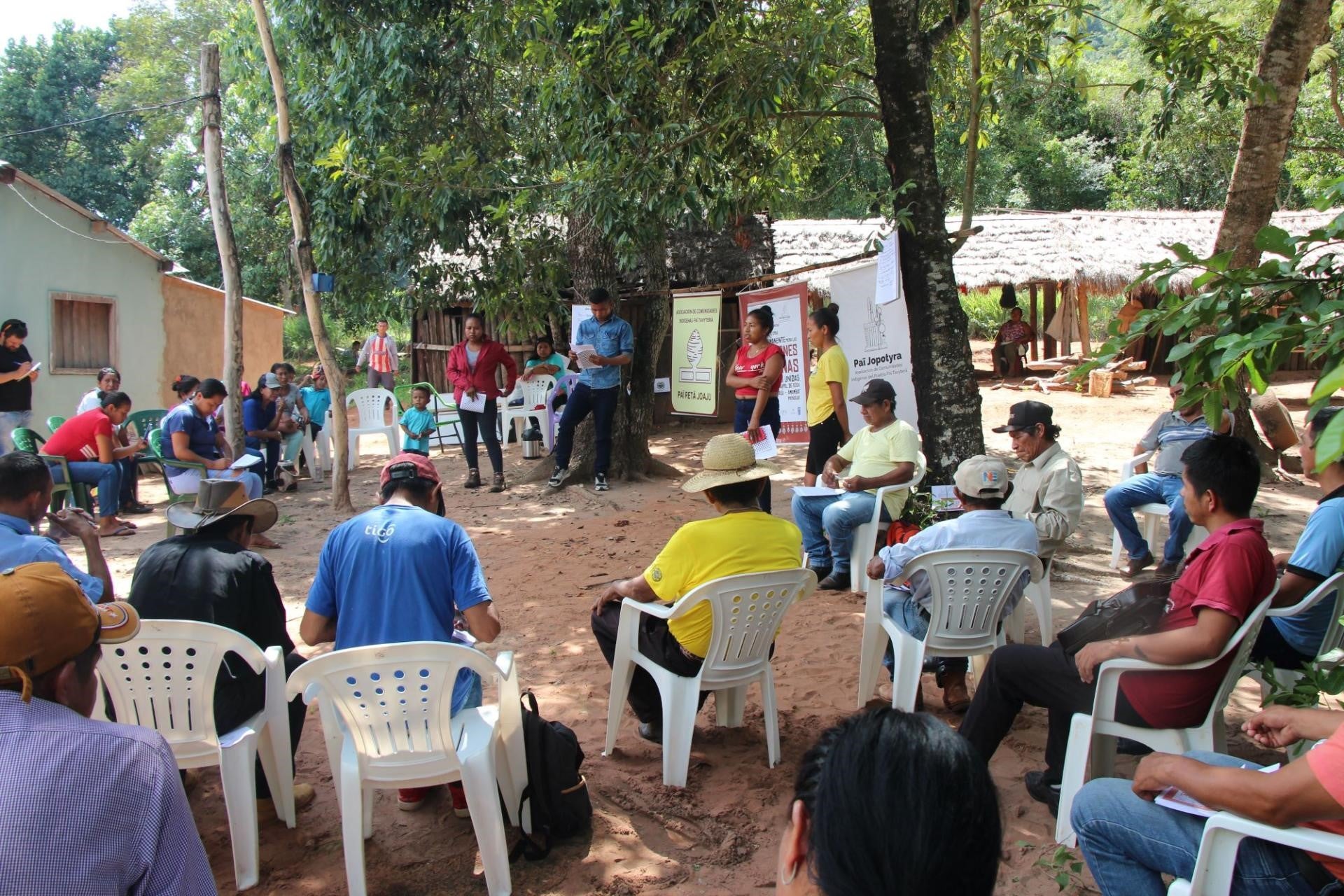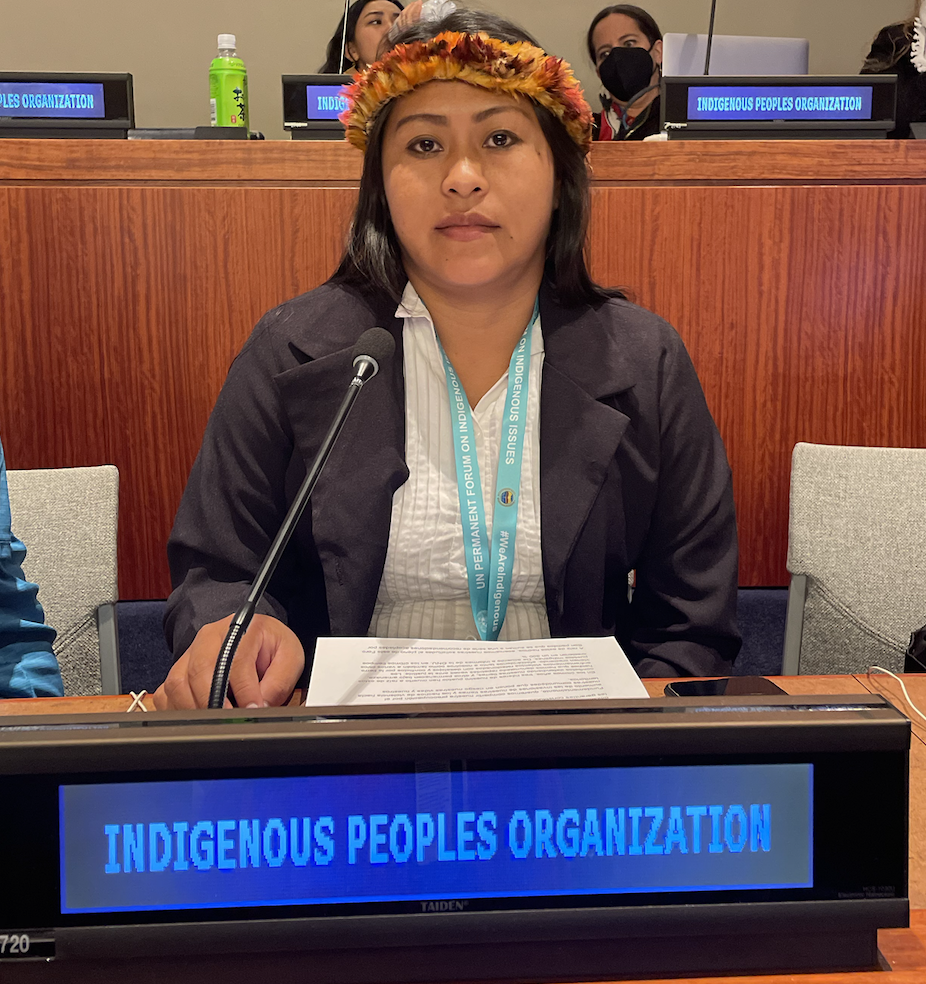
In April 2024, Rosalba Gómez Arce (Guaraní Paĩ Tavyterã) attended the 23rd session of the UN Permanent Forum on Indigenous Issues as a youth representative and spokesperson for three associations of Paĩ Peoples—Paĩ Reta Joaju, Paĩ Jopotyra, and Paĩ Rekopavẽ—in Paraguay. Currently, in her fifth year of law school, she is a young leader of the Paĩ Peoples’ women’s group. She has previously participated in other international meetings, such as the International Meeting on Indigenous Justice in Peru and the International Seminar on Women, Body, and Territory in El Salvador.
Gómez traveled to New York to bring to the world’s attention the urgent need to strengthen constitutional guarantees for the full exercise of her Peoples’ rights. She presented her community’s situation to State representatives and to a broader audience in the side event organized by Cultural Survival called “Indigenous Environmental Defenders in Latin America: Strategies to Support their Work and Protect their Lives,” alongside other Indigenous land defenders. Her aim was to share this information in the plenary of the Permanent Forum where many Indigenous Peoples’ community members share a brief statement with the Forum members, State representatives, Indigenous organizations, and other Indigenous communities from all over the world.

The community of Ita Guasu, Amambay, Paraguay and the leaders and representatives of various communities of the Guaraní Paĩ Tavyterã Peoples holding a preparatory session for their participation at the 23rd session of the UNPermanent Forum of the on Indigenous Issues. Photo by Gentileza Áry Ojeasojavo.
Though she did not have the opportunity to present her intervention at the plenary on behalf of her community, she did read it in the Indigenous Media Zone. “We are demanding that the Paraguayan State protect the rights of Indigenous Peoples. That the State intensify its efforts, and adopt the necessary measures as soon as possible to guarantee the protection of the land rights of Indigenous communities, paying special attention to the land currently threatened by the crime of invasion of Tekoja Guasu Yvy Pyte and the sacred site Jasuka Venda belonging to the Guarani Paĩ Tavyterã people, [and to] urgently enforce compliance with the rules and regulations that protect forests and biodiversity, preventing deforestation and other illegal practices that put forests and the lives of Indigenous people at risk.”
Although Paraguay has signed international laws and agreements, they are not currently being fulfilled. This leaves Indigenous Peoples with a worrying lack of protection, especially in relation to their lands, access to health and education, and the preservation of their forests, on which their way of life and livelihoods depend. Gómez says, “As Indigenous Peoples, we are going through a time of great difficulty due to continuous violations of the...constitutional guarantee of our legitimate rights. We want to share our concerns about rising invasions of our land and the violence against our communities, which put our lives and lands at risk. In the last few years, three leaders have been killed for defending our land, and others remain under threat for events that we have repeatedly reported. Violent clashes related to evictions and conflict over land have been growing, affecting us as well as several other Indigenous Peoples. According to a UN report, in recent times, they have grown by 300 percent.”

Rosalba Gómez Arce at the 23rd session of the UN Permanent Forum on Indigenous Issues in New York in April. Photo by Mariana Kiimi/Cultural Survival.
The militarization of northern Paraguay began about 11 years ago, but it was only 4 years ago, in 2020, that it reached the territory of the Paĩ Tavyterã, especially in the surroundings of Jasuka Venda, the Sacred site of the Paĩ Tavyterã people, which is located in the northeast of Paraguay near the border with Brazil, their territory encompasses the Paraná River Atlantic Forest, a 7,000-hectare stretch of tall forest and the source of many important resources. Areas like this that are rich in natural resources have been the most recent targets of armed groups. There have been several attacks on community members resulting in three killings of community leaders, and some community representatives continue to receive anonymous threatening phone calls warning them to vacate their lands. The Public Prosecutor’s Office so far has not charged the actors of the invasions that seek to dispossess the community of their titled lands, and the families of those killed continue to wait for justice.
Speaking as a land defender, Gómez says, “We are being invaded by strangers who entered our community illegally, especially the community of Yvy Pyte. The people who lived in one of the community sectors are leaving, abandoning their houses and leaving their farms out of fear. Many are now in the city of Pedro Juan Caballero near the garbage dump, and many children are sick. In many cases, we have no formal titles to our lands, and we do not have documents that support us or define what and where our community is. We have a lot of eviction threats in our community.”
Paraguay is party to International Labour Organization Convention 169 and the national constitution does include language on the rights of Indigenous Peoples. However, Gómez says, “[Our rights] are not fulfilled. We have reached out to many institutions making formal complaints, but we do not have any answers [from our government]. Jasuka Venda was also invaded by the illegal people who planted their illegal plantations. Every day, they are cutting down trees and destroying forests. And it is very worrying to us as Indigenous Peoples because these are our sacred places.” In New York, Gómez met with the permanent missions of the governments of Norway, the United Kingdom, Colombia, Denmark, and the Netherlands to speak about the situation her Peoples are facing. She says, “I have met many authorities, and I also participated in parallel meetings with young people. For me, it is very important to be here and bring a message of authority to my people with the hope that we can recover our communities. I think I have much more space [here] to talk to authorities. I did not imagine speaking with so many important authorities of each country. I have hope now that the authorities are going to send a message to the State of Paraguay so that it can manage these situations.”
In 2020, Cultural Survival and The American Indian Law Clinic of the University of Colorado submitted a stake-holder report to the Universal Periodic Review for Paraguay’s human rights record review in which we recommended establishing effective mechanisms for filing claims for the restitution of ancestral territories, monitoring the implementation of Free, Prior and Informed Consent (FPIC) protocols, and addressing future Indigenous land rights cases at the domestic level in a way that is in compliance with the UN Declaration on the Rights of Indigenous Peoples. Paraguay accepted a series of recommendations made by France, Germany, Senegal, Switzerland, and others regarding Indigenous rights and land.
Gómez highlighted her gratitude for traveling so far away and being able to tell the world about the issues her community is currently facing, as there are many obstacles for Indigenous women leaders from Latin America to access these spaces if they do not have the opportunity to get a visa or even a passport. Young Indigenous women such as Gómez have a very important role in representing women to uplift their demands and the struggles they face so that the international community knows what is happening and can take action in solidarity.
Gómez says her message to authorities in Paraguay is “to see the struggle of the Indigenous Peoples, to listen to Indigenous communities, and to have them see how communities are being affected. I would also tell them to return our land because it is ours, and in Yvy Pyte where the invasion occurred, we have titles. In the titled lands, we are safe, and if we don’t have a title, we are in danger.”
The Keepers of the Earth Fund is an Indigenous-led fund within Cultural Survival, which is designed to support Indigenous Peoples’ community advocacy and development projects. Since 2017, KOEF has funded 311 projects in 41 countries, through small grants totaling $1,607,859, as well as technical assistance, which have benefited 328 Indigenous Peoples in total. www.cs.org/koef
